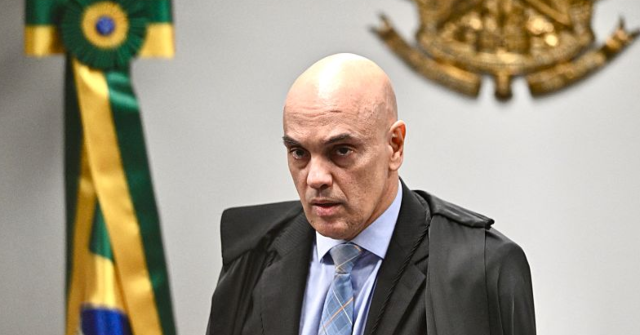U.S. Secretary of State Marco Rubio imposed U.S. visa restrictions over the weekend on Brazil Supreme Federal Tribunal (STF) Justice Alexandre de Moraes in response to his role in the censorship of Americans and the political “witch hunt” against former President Jair Bolsonaro.
The restrictions, the State Department explained, also targeted de Moraes’ court allies and their immediate family members. According to Brazil’s Attorney General Jorge Messias, other STF justices and Prosecutor General Paulo Gonet, who recently called for Bolsonaro’s conviction, had their U.S. visas revoked.
“President Donald Trump made clear that his administration will hold accountable foreign nationals who are responsible for censorship of protected expression in the United States,” Sec. Rubio announced in a statement on Friday. “Brazilian Supreme Federal Court Justice Alexandre de Moraes’s political witch hunt against Jair Bolsonaro created a persecution and censorship complex so sweeping that it not only violates basic rights of Brazilians, but also extends beyond Brazil’s shores to target Americans.”
“I have therefore ordered visa revocations for Moraes and his allies on the court, as well as their immediate family members effective immediately,” Rubio stated:
De Moraes has not publicly commented on the U.S. Visa restrictions at press time.
The visa restrictions were issued hours after the STF judge ordered a “precautionary” police raid on Bolsonaro’s home on Friday morning, leading to his brief arrest and the imposition of a mandatory electronic ankle monitor, curfew, and other strict restrictions on Bolsonaro that Brazilian police officials reportedly told local outlets are comparable to that of a “semi-open” house arrest situation.
In addition to the anklet, de Moraes prohibited Bolsonaro from using any social media and forbade him from speaking to his son, lawmaker Eduardo Bolsonaro, who requested political asylum in the United States in March. Jair Bolsonaro is also prohibited from being within 200 meters (0.12 miles) of any foreign embassy, speaking to any foreign diplomat, and he cannot leave the capital city of Brasília, where he resides.
De Moraes, who is also the rapporteur of the ongoing coup trial against Bolsonaro, reportedly justified the measures by accusing Bolsonaro of engaging in “extortion” against the STF with the purported aim of seeking amnesty in exchange for U.S. tariff relief for Brazil. Bolsonaro stands accused by the Brazilian top court of conspiring with others to stage a “coup” and overturn the results of the 2022 election, which he narrowly lost against radical leftist President Luiz Inácio Lula da Silva.
President Donald Trump announced a 50 percent tariff on Brazilian goods entering the United States this month which will go into effect on August 1. President Trump cited the “witch hunt” against Bolsonaro, attacks on Brazil’s free elections, and attacks against the fundamental free speech rights of American citizens committed by the STF as reasons for the upcoming tariffs. STF President Luís Roberto Barroso, the equivalent of a Supreme Court chief justice, denied President Trump’s claims in a public letter.
President Lula published a message on Saturday expressing his “solidarity and support” to all STF justices targeted by the U.S. visa restrictions — an action Lula described as “yet another arbitrary and completely unfounded measure by the U.S. government.”
“The interference of one country in the justice system of another is unacceptable and violates the basic principles of respect and sovereignty between nations,” Lula’s message read.
“I am certain that no type of intimidation or threat, from anyone, will compromise the most important mission of national powers and institutions, which is to act permanently in defense and preservation of the Democratic Rule of Law,” he continued:
Alexandre de Moraes is one of the most prominent Brazilian justices, an “anti-fake news crusader” who has been at the forefront of a litany of censorship actions against American social media, streaming, and messaging platforms such as Facebook, Twitter, Instagram, and WhatsApp.
For the past six years, the controversial justice has used an active inquiry against alleged “fake news” circulators, and a separate inquiry to investigate so-called “anti-democratic digital militias” that spread “fake news” and “threaten democracy” in Brazil, leading to broad police action against conservatives.
De Moraes was at the forefront of a censorship campaign against former President Bolsonaro during the 2022 presidential election. At the time, de Moraes prohibited Bolsonaro’s campaign from calling Lula a “thief” or “criminal,” referencing Lula’s multiple convictions on corruption charges. De Moraes did not issue similar censorship rulings against Lula’s campaign accusing Bolsonaro of being a “cannibal” and a “pedophile.”
The Brazilian outlet Poder 360 reported on Monday morning that the restrictions imposed on Bolsonaro that prohibit him from being within 200 meters of an embassy prevent Bolsonaro from going many places in the capital city, including hospitals. Bolsonaro, 70, faces recurring health complications after a man identified as Adelio Bispo de Oliveira stabbed him during a 2018 campaign rally event.
Poder 360 explained that if Bolsonaro needs to go from his residence in Brasília’s Jardim Botânico neighborhood to a hospital or clinic in the event of an emergency, he will then have to plan a “complex route” to avoid the risk of violating de Moraes’ orders. The outlet pointed out that there are two major hospitals close to Bolsonaro’s home, but that they are “very close” to the dozens of embassies and consulates in the area, asserting that “Bolsonaro or the driver taking him would have to go out of their way to avoid these places.”
Christian K. Caruzo is a Venezuelan writer and documents life under socialism. You can follow him on Twitter here
Read the full article here


